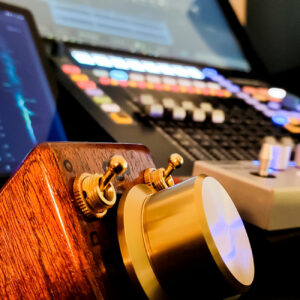How to distribute music online as an independant artist
Distributing your music online as an independent artist allows you to retain more control over your music and career, as well as potentially generating additional revenue streams, compared to signing with a record label which may have more control over your music and career and take a larger percentage of your earnings despite the eventual visibility and help that they might offer within their contract.
Of course, distributing your music yourself implies additional work and to be aware of various things. We’ve made a general guide of the main things you should know:
Choosing a distribution platform
There are many platforms that allow independent artists to distribute their music online, be it for streaming or downloads. Each platform has its own features and pricing, so it’s important to research and compare them before making a decision.
Here are a few suggestions:
- Prioritize Bandcamp as they are the most respectful towards the artists and gives the most money back to you,
- Choose one Aggregator (companies that will upload your music to most of the streaming platforms and online store such as Spotify, Tidal, Deezer, Quobuzz, Amazon Music, Youtube Music and more…): Distrokid, Songtradr, Labelworx, CD Baby, Tunecore are widely used options that are worth checking up. Again, they all have their own pricing and terms of use regarding the payment of royalties, etc.
So it’s important to research and compare all of those details before choosing your aggregator.
Prepare your music
Before uploading your music to your chosen aggregator, make sure it is properly encoded and that it’ll translate optimally on most platforms and sound systems with a professional mastering.
This includes, among other things, ensuring that the audio is well balanced in terms of tonality, dynamics, panoramic; that it doesn’t have any unwanted clicks, pops, clips or else, that the metadata is accurate, and that the track sequencing is how you want it to be in case of an EP or Album. You’ll also have to consider your artwork(s) if not already done at this stage.
Read more about: What is mastering?
Create an account
Most distribution platforms will require you to create an account before you can start uploading your music. Follow the platform’s instructions to create an account and set up your artist profile.
Upload your music
Promote your music
Once your music is available for streaming and sale, it’s important to promote it to your fans and potential listeners. There are many ways to spread the word about your music, such as:
- Sharing teasers and extracts on social media,
- Sending email presskit about your release to industry medias, bloggers, podcasters to get your music featured on their platform or content.
- Submitting your release to playlists editors,
- Embedding your release on your own website,
- Paid advertising: additionaly you can also choose to use paid advertising on platforms like Facebook, Instagram and Google Display Network to promote your music to a targeted audience. However unless for a very specific and carefully thought out campaigns, this is not something we recommend for independant artists just starting out. There might be better investment for your money at this point.
- Play live! Play live shows and build a following in your local area.
Ultimately, the key is to be creative and persistent in your efforts to promote your music, and to always be looking for new ways to connect with fans and gain exposure.
Keep track of your sales and streams
Most distribution platforms will provide you with sales and streams reports, which can help you track your performance and see how your music is doing. Use this information to adjust your marketing efforts and improve your overall strategy over time.
Monetize your music
As an independent artist, monetizing your music is important in order to support your career and generate revenue streams. There are a number of ways to monetize your music, including but not limited to:
- Selling merchandise: This can include items such as t-shirts, hats, and other items with your band name or logo. This can be a great way to generate revenue and also promote your music.
- Selling concert tickets: Touring and performing live shows is a great way to promote your music and connect with fans. Tickets for your live shows can generate significant revenue for your music career.
- Selling digital products: This can include selling digital downloads of your music, or offering exclusive content such as behind-the-scenes footage or exclusive songs to fans who purchase your music.
- Sync royalties: You can generate revenue from placing your music on to some audiovisual projects such as ads, movies and more.
- NFTs: NFTs (Non-Fungible Tokens) are digital assets that can represent ownership of a digital item, such as a song, artwork, or video. As an independent artist, you can create and sell NFTs of your music and merchandise to fans.
- Sponsorships and brand deals: As your fanbase and audience grow, you can potentially partner with brands to create sponsored content or have them sponsor your tour or events.It’s important to note that it’s crucial to have a diversified revenue stream, as relying on one specific income stream can be risky. By monetizing your music through different channels, you can ensure that you have multiple sources of income to support your career.
Our piece of advice
In conclusion, distributing your music online as an independent artist can be a great way to retain control over your music and career, while also generating additional revenue streams.
Choosing the right distribution platform, preparing your music, creating an account, uploading your music, and promoting your music are all important steps to take. Additionally, it’s important to monetize your music through various channels, such as selling merchandise, concert tickets, digital products, streaming royalties, NFTs, sponsorships and brand deals.
By following these guidelines and being persistent and creative in your efforts, you can increase your visibility and reach new listeners. Remember, it’s important to have a diversified revenue stream and be strategic on where to invest your money.
This will help you to build a sustainable career as an independent artist.
2 reviews for Mastering (1 Track)
Only logged in customers who have purchased this product may leave a review.
Learn More!
Browse more articles below



Guilou (verified owner) –
Great quality. Great communication and feedback.
They give a professional touch to your track while still taking into account all your wishes and demands.
I recommand !
Beat Blender (verified owner) –
I had a mastering from DSP and i have to tell you that this guy knows what he does. The analysis of my mixdown was really to the point, i changed what he suggested and it my mixdown was really a REAL mixdown.
The mastering itself was also sublime, of course every body has his own wish but the change of the track was done also if he made the track himself.
I’m a big fan. Keep up the good work Evan.